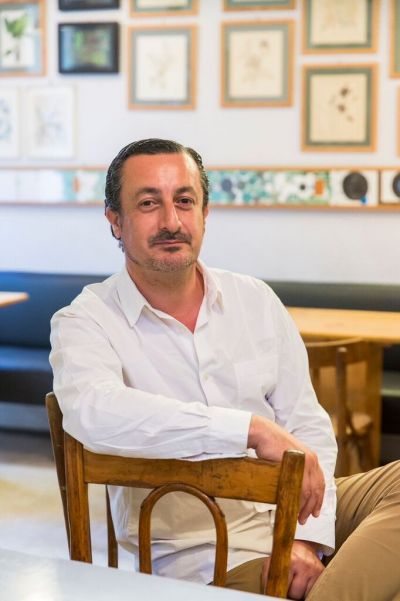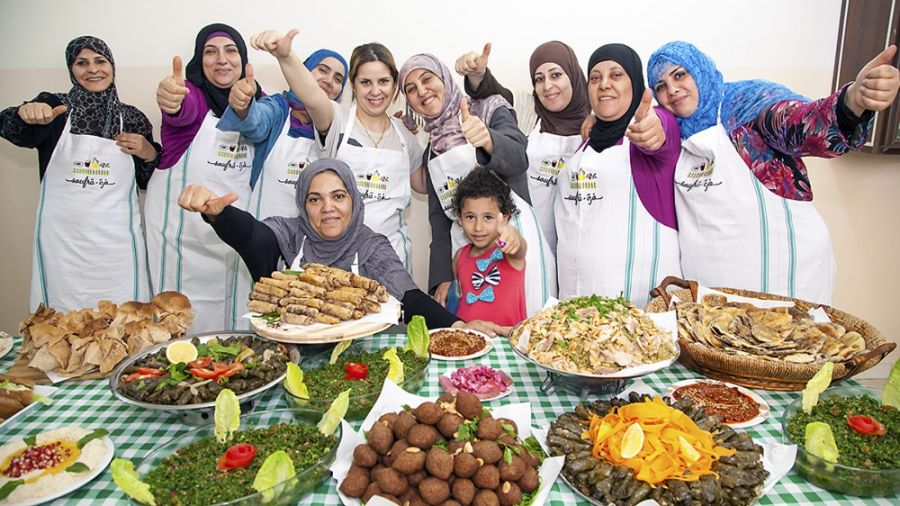
Workshop
Lebanon: the land’s lesson for a ‘good life’
“Lebanon? Well, Lebanon is a real case-study of the world of the twenty-first century. In today’s world, information, ideas and people move incredibly fast, and the consequence is that even in those countries where there used to be a clear distinction between majority and minorities, the ‘other’, the ‘different’ is now more and more present. And, you see, Lebanon has always been like that: we are a country that has no majority and no minorities. We’re half Christians, half Muslims; half people looking to the sea, half people looking to the mountains…”.
Kamal Mouzawak, entrepreneur, activist and food and travel writer, tells me about his country over the phone, while the sounds of Beirut traffic echo in the background. So what’s life like in a country like that? Here, like elsewhere, the key is in the way one chooses to look at diversity.
“Either we’re going to be afraid of one another, and go on killing each other like we did for such a long time, or at one point we’re going to stop and think”. Think about whether differences in political views, religious beliefs or ethnicity should really have the final word, or whether, beyond all that, there is something that unites the Lebanese people. For Kamal, the son of farmers and producers, the answer is in the land itself: “we all live on the same land, and we make the same agriculture and the same cuisine out of it”.
In 2004, Kamal’s intuition and his love of the land and its people pushed him into launching Souk el Tayeb – a market, but not just any market. This is the ‘Good Market’ (in Arabic, souk means market and tayeb means good, both in taste and in character), a place where, between a piece of thyme and sesame bread and a spoonful of orange blossom honey, a united nation is built. After all, what speaks better of a nation than its own food?
Every week, for two days, Beirut is filled with the scents and colours of the freshest produce from the countryside, brought directly into the city by the farmers themselves. In this direct relationship with the consumers, producers receive recognition and a fair price for their work. For city buyers, aside from being the go-to spot for fresh and organic food, the Souk is the place where distant regions they hardly know about or may even have prejudice against become people with faces, stories and a culinary heritage to share.

Following the opening of the Souk, Kamal and his colleagues came up with the idea of organising regional food festivals around the country, bringing the people of Beirut to the very places where their favourite food is produced.
This is a way for people from different backgrounds to get to know each other better, and for city dwellers to get a sense of how important the countryside is to the development of the entire country.
“That way it is easier to understand, for example, that milk doesn’t come in a box on a supermarket shelf but that someone in the countryside has to do it, you know, and it costs a lot of time and energy” – the project founder explains. “Rural areas deserve to grow and people there deserve to have as good a life as the people of the city”.
Souk el Tayeb is a kitchen, too – or, better, a ‘table’: from the experience of the market and the food festivals, six restaurants called ‘Tawlet’ (literally, ‘table’) have opened all over Lebanon. The idea is simple: having lunch here is like eating at home. The people involved in Souk el Tayeb include several village cooks, most of whom are women. They are the keepers of traditional recipes and of the typical Lebanese good taste, and Tawlet’s kitchens are a space for them to share their talents and creativity, just like they would do at home.

Tawlet Beirut, a restaurant that ranked ninth in the world in the Monocle Magazine’s 2016 Restaurant Awards, is a national kitchen. Each day, a different woman from a different region comes in to cook her signature dishes – from the Armenian specialties prepared by Sona Tikidjian of Bourj Hammoud to the fried fish with garlic and coriander from Tripoli, the home of Josephine Ghaleb. Visitors here get rich and surprising food experiences, but each meal is first and foremost an opportunity to discover diversity. Tawlet is not an epicurean project about food: in fact, food here is a vehicle of unity.
“We’ve decided to put food at the centre of our project” – explains Kamal – “because food is the simplest expression of identity, of tradition”. Just like architecture, costume, music and dance. Food, however, is the one expression that goes the most beyond space and time, carrying within itself the history and life of a nation. And, what’s more important, food can be shared, uniting both those who cook and those who eat together. That is something Mona, a Shiite Muslim from the South, and Suzanne, a Maronite Christian from the North, have experienced firsthand. Both these women are famous for their kibbeh, a traditional meat dish, which they sometimes cook together.
“You don’t cook with an enemy. Likewise, they can’t work together or cook together unless they are one family” – Kamal tells me when I ask him about these two ladies – “you need to build a space of trust first”. Suzanne and Mona found that space amidst the Souk stalls, where they used to meet before they were invited to cook at Tawlet.
“When you come here, you are willing to accept the other” – that is the rule of the Good Market. “Even if you had problems with the other in the past, when you come here you decide to turn a page and to look at the other from a different angle, to see him or her just as another ‘you’. He or she may have a different political opinion or religion, but at the end of the day you both share the same fears, the same problems and the same expectations”, Kamal explains. Once again, it’s a choice: to stop at the differences or to invest in building a common ground and in trying to live together. Souk el Tayeb, a business combining both social responsibility and rigorous management, has decided to take up the challenge.
The city of Saida, in Southern Lebanon, is home to another one of the project’s ‘tables’. Every day, women from the old town come together in the kitchen. Some of them are Lebanese, others are from the local Syrian and Palestinian refugee communities.
Today, Saida is a poor city facing some major social challenges. Recently, public and private funds have given new life to the old market quarter, and that is where the restaurant, the latest jewel of the Tawlet family, opened its doors earlier this year. It was created in partnership with the Hariri Foundation for Sustainable Human Development, to develop the skills of the local community of women and to shine a spotlight on the culinary heritage of the region.
Earlier in 2017, just before the restaurant was inaugurated, Kamal told British newspaper The Guardian about another hope he nurtured for this place: to have visitors from Beirut tour the streets and meet the people of the old town, to help dissolve the fear of an area that many see as a ghetto, as dangerous. “We are just trying to introduce them, to get them to know each other, and then they will see that there is no ‘other’”, he said.
On 5th November 2017, Tawlet Beirut celebrated its eighth anniversary. Sixteen women were invited to cook for the occasion, and they told the story of Lebanon through their dishes – a story that Kamal wants to keep on sharing, through new restaurants, new recipes and new protagonists.
“My dream is to take the Souk el Tayeb experience abroad” he tells me. “I’d like to start a similar project in Paris or Milan, and have women from the city and the region, and the different communities that live in the city, cook together”.
The agenda for Kamal therefore is clear: to keep creating new spaces for cooperation and trust around the world through the art of food.



